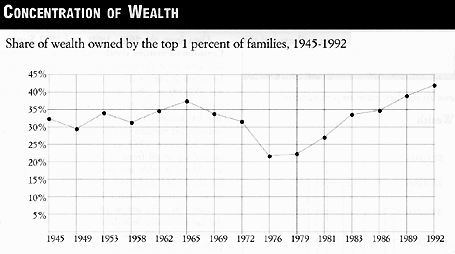Tocqueville, in a similar vein, argued that the distinctive character of the American political system was the high degree of material equality found in America. In comparison to aristocratic Europe, Tocqueville was clearly correct, but in fact there was a great deal of inequality in early America, indeed only slightly less than there is now. For example, the bottom seven deciles in 1776 owned a mere fifteen percent of all wealth and in 1973 the bottom seven deciles also owned fifteen percent of all wealth. In the past two hundred years, what has changed is that wealth has become more highly concentrated in the upper reaches. In 1774, the top 1% owned 15 percent of all wealth, but by 1973 the top one percent of families owned 32.6 percent of all wealth, and by 1989 the top one percent owned nearly 40% of all wealth (NYT 4/17/95). Thus, the rich truly did get richer. Over the same period, the gini coefficient increased from .73 in 1774 to .81 in 1973. (Osberg, p. 44.) Since 1983 the distribution of wealth has become even more uneven. The top one percent's share went from 32.6 percent in 1973 to 37 percent in 1989. (Osberg on earlier data, Peterson on later data.) As the graph below shows, in the 1990's the share of wealth owned by the top one percent exceeded 40 percent.

The significance of this data is that a basic presumption of virtually all versions of democracy is that there is a direct relationship between the distribution of wealth and income on the one hand, and the possibility of democracy on the other. Extreme economic inequalities lead inexorably to inequalities of power. What is at stake, then, is the possibility of democracy. Since wealth can be translated into political power, extreme inequalities in the distribution of wealth tend to produce extreme inequalities in political power. Indeed, virtually every study of political participation, which is, of course, relevant to the exercise of political power, have found a direct relationship between SES and political activity (explain). Likewise, in each succeeding edition of Dye's book, the concentration of wealth and income has increased, and the number of individuals who control more than half the nation's power has decreased. But the reverse is also true. Extreme inequalities of political power lead to extreme economic inequalities. As Wallace Peterson has noted: "Control of the central government is the key to having a major voice in determining the distribution of income and wealth." (p.95) ...
No comments:
Post a Comment